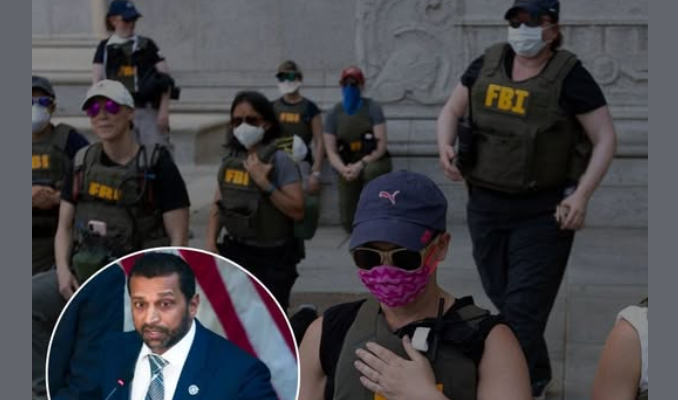It took five long years, but the FBI has finally fired the agents who knelt during the George Floyd protests in Washington, D.C., back in June 2020. For half a decade, the Bureau tiptoed around the obvious, dragged its feet through internal reviews, and let the issue fester. But now, the hammer has finally come down on roughly 15 to 20 agents who took part in what many viewed as an act of political theater — siding with protesters at the very moment they were tasked with upholding federal law and order.
Let’s rewind. In June 2020, in the middle of a national lockdown, protests erupted across the country following the death of George Floyd. What began as a call for justice quickly morphed into chaos in several cities. Businesses were looted, public buildings were vandalized, and violent clashes broke out. Washington, D.C. was no exception. Amid the unrest, photos emerged of FBI agents — federal law enforcement officers — taking a knee in apparent solidarity with protesters.
At the time, “taking a knee” wasn’t a neutral gesture. It was a loaded political symbol, one that had grown from a silent NFL protest into a broader ideological statement. For FBI agents — men and women sworn to enforce the law impartially — to adopt that posture, on the job, in uniform, in front of demonstrators, raised serious red flags. Whose side were they on? What message were they sending?
Critics of the FBI pointed to the kneeling as evidence of a deep-rooted political bias. After all, the same agency that had been dogged by accusations of partisanship during the Trump-Russia investigation now had agents publicly aligning with one side of a highly charged national debate. The optics were awful. The message to the public was worse: that the FBI’s neutrality was, at best, questionable.
What’s baffling is how long it took for the agency to act. Any other law enforcement department in the country would have handled this swiftly. But the FBI is not just any agency. It is the most powerful domestic law enforcement body in the country. With that power comes responsibility — and the need to maintain the trust of the American people. When its agents kneel before a crowd during a time of unrest, it erodes that trust.
Some have rushed in to defend the agents, claiming they were simply trying to de-escalate a tense situation. Maybe they were. But even if we accept that argument, it only underscores how poorly trained they were. De-escalation doesn’t require symbolic submission. It requires presence, professionalism, and clarity of purpose. These agents weren’t caught in a moment of confusion — they made a conscious choice to take a political stance while wearing the badge of federal authority.
At best, their actions were misguided. At worst, they were acts of political theater, a calculated display to align with a movement that, at times, included calls to defund or even abolish the very institutions these agents represent. That’s not just inappropriate — it’s a betrayal of their oath.
It’s also important to recognize what the crowd represented at that moment. While many protesters were peaceful, others were not. Across the country, federal buildings were under attack, police officers were injured, and cities burned. These weren’t isolated events. In places like Portland and Seattle, federal agents faced organized, sustained assaults. In that context, kneeling wasn’t a neutral gesture — it looked like a surrender.
There was no imminent threat to the FBI building in D.C. when those agents took a knee. There was no clear tactical necessity. What there was, however, was a desire to appease. That kind of behavior, especially in law enforcement, can’t be tolerated.
The FBI finally made the right call. The agents are out. It should never have taken this long, but at least a line has been drawn. Federal agents are not social activists. They are not there to virtue signal. They are there to uphold the law — without fear, favor, or political preference.
In a time when public trust in institutions is already dangerously low, moments like this matter. Americans need to know that the people enforcing the law aren’t taking sides in political or cultural battles. That’s not just professionalism — it’s essential for the survival of a republic built on the rule of law.
Let this be a warning to anyone else who thinks the badge is a platform for politics: it’s not.



